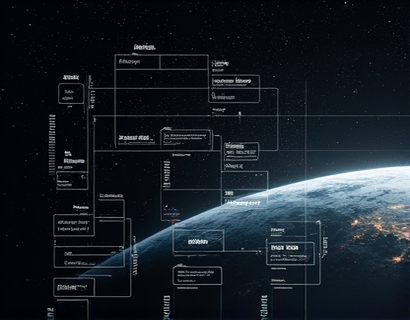Decentralized DAO Management: Elevate Governance with Advanced Analytics Software
In the rapidly evolving landscape of decentralized finance and governance, Decentralized Autonomous Organizations (DAOs) have emerged as a transformative force. These organizations leverage blockchain technology to achieve decentralized decision-making, fostering transparency, and inclusivity. However, effective governance in DAOs remains a complex challenge, often hampered by inefficiencies and lack of comprehensive oversight. This article delves into how advanced analytics software can revolutionize DAO management, enhancing governance through streamlined processes, data-driven insights, and improved collaboration.
Understanding DAO Governance Challenges
DAOs operate on a unique model where decisions are made collectively by token holders, often through on-chain voting mechanisms. While this model promotes decentralization and community involvement, it also introduces several governance challenges. One major issue is the complexity of managing large volumes of data and ensuring that all stakeholders have access to the necessary information to make informed decisions. Additionally, the lack of real-time analytics and comprehensive reporting tools can lead to delayed or misinformed decisions, impacting the overall efficiency and effectiveness of the DAO.
Another significant challenge is ensuring transparency and accountability. In a decentralized environment, it is crucial to maintain trust among members, which can be undermined by opaque decision-making processes. Traditional governance methods often rely on centralized authorities to oversee operations, but in a DAO, this centralization can contradict the very principles of decentralization. Advanced analytics software can bridge this gap by providing transparent, real-time insights into DAO operations, thereby enhancing trust and accountability.
Role of Advanced Analytics Software in DAO Governance
Advanced analytics software plays a pivotal role in elevating DAO governance by addressing the aforementioned challenges. These tools offer a suite of features designed to streamline management, enhance collaboration, and provide comprehensive analytics. By leveraging these technologies, DAOs can make more informed decisions, foster greater transparency, and achieve sustainable growth.
Streamlining Management Processes
One of the primary benefits of advanced analytics software is its ability to streamline governance processes. Traditional DAO management often involves manual tasks such as data collection, reporting, and voting coordination. These tasks are not only time-consuming but also prone to human error. Advanced analytics platforms automate these processes, reducing the administrative burden on DAO administrators and allowing them to focus on strategic decision-making.
For instance, automated reporting tools can generate real-time dashboards that display key metrics and KPIs, providing a clear overview of the DAO's performance. This immediate access to data enables administrators to monitor progress, identify issues, and take corrective actions swiftly. Moreover, automated workflows can be set up to trigger notifications and alerts, ensuring that critical events are promptly addressed.
Enhancing Collaboration and Communication
Collaboration is a cornerstone of successful DAO governance. Advanced analytics software facilitates better communication and collaboration among members by centralizing information and providing collaborative tools. Dashboards and reports can be shared with specific groups or the entire membership, ensuring that everyone has access to the same data. This transparency fosters a sense of ownership and engagement, encouraging active participation in governance processes.
Additionally, some analytics platforms include discussion forums, voting mechanisms, and other collaborative features directly integrated into the toolset. These features enable members to discuss proposals, provide feedback, and vote on decisions within the platform, streamlining the entire governance workflow. By keeping all interactions and decisions within a single, secure environment, these tools enhance transparency and reduce the risk of miscommunication.
Providing Comprehensive Analytics
Comprehensive analytics are essential for data-driven decision-making in DAOs. Advanced analytics software offers a wide range of analytical tools that help administrators gain deep insights into various aspects of DAO operations. These tools can process large datasets, perform complex analyses, and generate actionable insights.
For example, predictive analytics can forecast future trends based on historical data, helping administrators anticipate potential challenges and opportunities. Sentiment analysis can gauge the mood of the community, providing valuable feedback on proposed changes or initiatives. Financial analytics tools can track budget allocations, expenditure patterns, and revenue streams, ensuring financial transparency and accountability.
Moreover, customizable dashboards allow administrators to focus on the metrics that matter most to their DAO. By visualizing data through charts, graphs, and other visual aids, these dashboards make complex information more accessible and easier to interpret. This data-driven approach ensures that decisions are based on solid evidence rather than assumptions, leading to more effective and sustainable governance.
Ensuring Transparency and Trust
Transparency is a fundamental principle of DAOs, and advanced analytics software plays a crucial role in maintaining this transparency. By providing real-time access to data and decision-making processes, these tools build trust among members. When stakeholders can see how decisions are made and how resources are allocated, they are more likely to feel confident in the governance structure.
Audit trails and immutable records are other features that enhance transparency. Advanced analytics platforms can maintain a tamper-proof log of all transactions and decisions, ensuring that the history of the DAO is accurately documented. This level of transparency not only builds trust but also deters malicious activities, as all actions are recorded and verifiable.
Furthermore, public reporting tools can be used to share key insights and performance metrics with the broader community. This external transparency can attract more members and investors, as it demonstrates the DAO's commitment to openness and accountability. By fostering a culture of transparency, advanced analytics software helps DAOs maintain a strong reputation and attract long-term support.
Case Studies and Real-World Applications
Several DAOs have successfully implemented advanced analytics software to enhance their governance. One notable example is a decentralized governance platform that used analytics tools to streamline its decision-making process. By automating data collection and reporting, the platform reduced the time required for annual reports from several weeks to mere minutes. This efficiency allowed the DAO to respond more quickly to community feedback and make timely decisions.
Another case study involves a DAO focused on sustainable projects. The organization utilized sentiment analysis to gauge community support for various initiatives. This insight helped them prioritize projects that resonated most with the community, leading to higher participation rates and successful outcomes. The use of financial analytics tools also ensured that funds were allocated efficiently, with clear tracking of expenditures and revenue generation.
These examples demonstrate the practical benefits of advanced analytics software in DAO governance. By leveraging these tools, DAOs can overcome traditional challenges, foster a more engaged community, and achieve their goals more effectively.
Implementing Advanced Analytics in Your DAO
For DAOs looking to integrate advanced analytics software into their governance framework, several steps can be taken to ensure a smooth transition and maximum benefit.
Conduct a Needs Assessment
The first step is to conduct a thorough needs assessment to identify the specific challenges and requirements of your DAO. This involves engaging with key stakeholders to understand their pain points and desired outcomes. Common areas to focus on include data management, reporting, collaboration tools, and analytical capabilities.
Once the needs are clearly defined, research the market to find analytics platforms that align with your DAO's goals. Consider factors such as scalability, ease of use, integration capabilities, and customer support. It's essential to choose a solution that is flexible and can grow with your DAO.
Select the Right Tools
Based on the needs assessment, select a suite of analytics tools that address the identified challenges. Look for platforms that offer a comprehensive set of features, including data collection, reporting, collaboration, and advanced analytics. Open-source solutions can be a cost-effective option, but ensure they meet your technical requirements and have a supportive community.
When evaluating tools, consider their compatibility with existing systems and the ease of integration. A seamless integration process minimizes disruption and ensures a smooth transition. Additionally, assess the security measures in place to protect sensitive data and maintain compliance with relevant regulations.
Train and Onboard Members
Once the tools are selected, it's crucial to train and onboard DAO members to ensure they can effectively use the new system. Provide comprehensive training sessions, tutorials, and documentation to help members understand the features and benefits of the analytics platform.
Encourage feedback and support during the onboarding process to address any concerns and facilitate adoption. Creating a dedicated support channel or community forum can be beneficial in providing ongoing assistance and fostering a collaborative environment.
Implement Gradually
Implementing advanced analytics software should be a gradual process to allow for adjustments and fine-tuning. Start with pilot projects or small-scale implementations to test the tools and gather feedback. This approach helps identify any issues early on and allows for necessary adjustments before a full-scale rollout.
Monitor the performance of the new system closely, tracking key metrics and gathering user feedback. Use this data to make iterative improvements and optimize the governance processes. Continuous improvement ensures that the analytics platform remains aligned with the evolving needs of the DAO.
Conclusion
Advanced analytics software represents a transformative opportunity for DAOs to elevate their governance, enhance collaboration, and drive sustainable growth. By addressing the challenges of data management, transparency, and decision-making, these tools empower DAOs to operate more efficiently and effectively. As the decentralized ecosystem continues to mature, the adoption of such technologies will become increasingly essential for success.
Embrace the potential of advanced analytics to transform your DAO's governance. With the right tools and a strategic approach, you can build a more transparent, collaborative, and resilient organization that thrives in the dynamic world of decentralized finance.










































